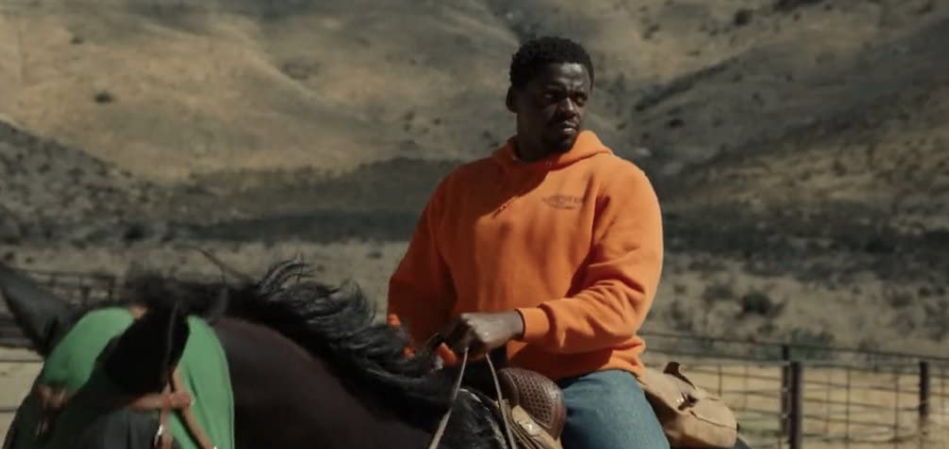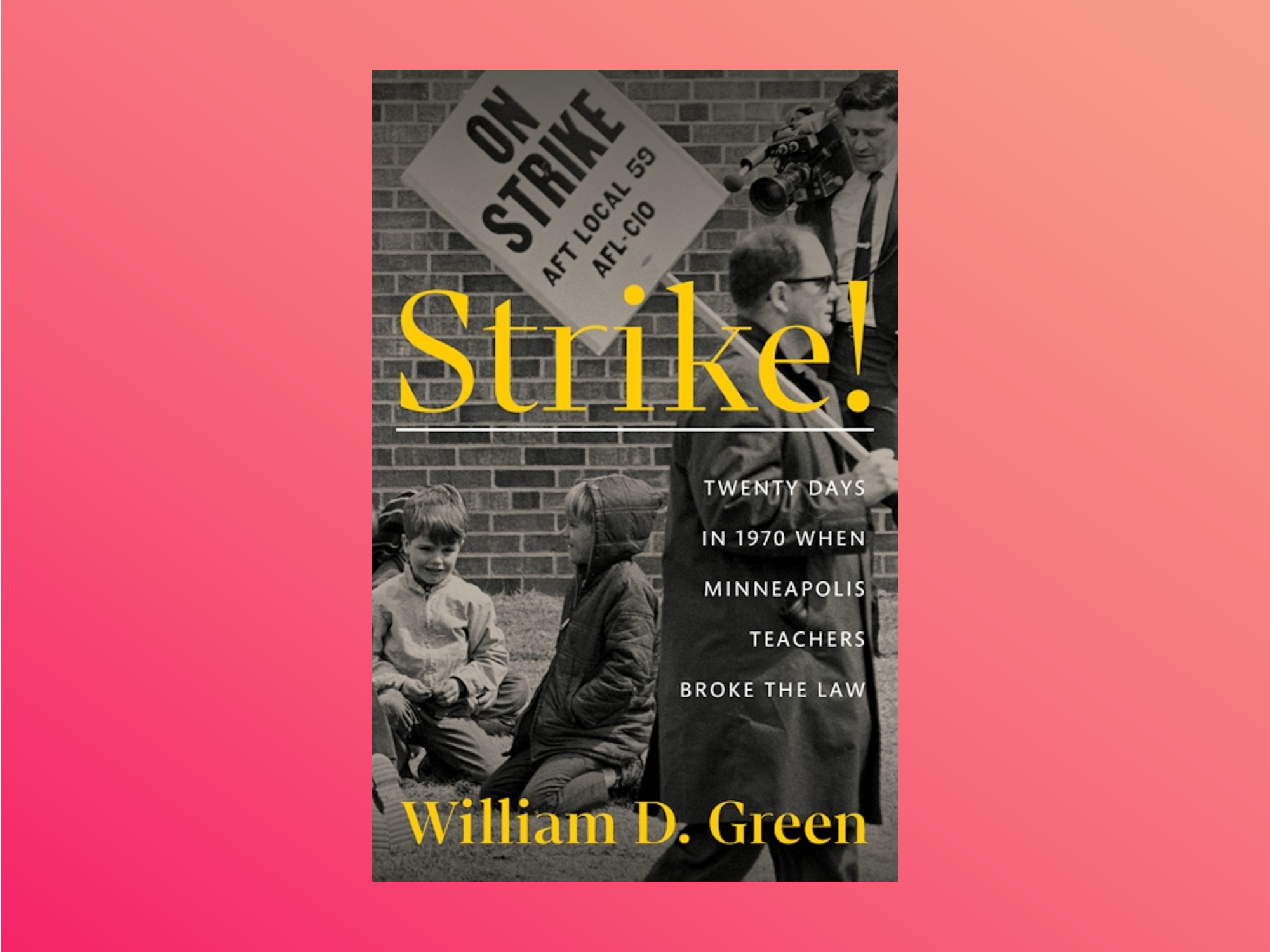Nope raises a lot of important questions, starting with “What the hell did I just watch?” Jordan Peele’s third film is scary, funny, mysterious, exciting—all adjectives we love to see. But it’s also funny when you expect scares, mysterious when you expect action, scary when you exp—you get the picture. It’s a thriller that keeps your expectations off balance so nimbly that the imbalance itself either becomes the thrill itself or leaves you with the wriggling fidgets. Enter the theater with pure fright in mind and you’ll leave as confused as some poor schmuck still wondering whatever happened to that money Janet Leigh stole from her boss before she ran into Norman Bates.
Get Out was as taut dramatically as it was conceptually; the more baroquely Us accumulated pop culture referents the more claustrophobic its terror grew. But both the plot and motifs of Nope are as rangy as the California landscape where its clash with alien invaders is set. This is a comic/action/horror/sci-fi/Western where those slashes, the spaces between, matter more than the genre tags. Somehow its black cowboys and murderous stage chimps and obsessions with surveillance tech are all thematically connected, even if your brain’s really gotta squint hard to follow.
The less you know going into Nope the better; no one should deny themselves the exquisite pleasure of Peele’s expert fake-outs, which are the narrative or conceptual equivalent of the jump scare. (Not to mention the actual scares—a dying radio here renders Corey Hart as forever spooky as Us did “Got 5 on It.”) If you’ve read a review already, I pity ya. But at this point I’m just going to assume you’ve seen it. The movie’s been in theaters a full week, its existence is hardly a secret, and if we’re gonna untangle its threads together we can’t be deferentially tiptoeing around its plot forever.
History saturates every object in Nope. So when the mysterious hail of largely unseen objects that fells Otis Haywood Sr. (Keith David) at the film’s start includes an Indian Head nickel that puts out his eye, you should start taking notes. We’re in a world where the legacy of genocide, celebrated through capital, resurges to blind the innocent and guilty alike. To turn to more narrative concerns, this incident leaves taciturn son Otis Jr. (Daniel Kaluuya, and just guess his unfortunate nickname) and outgoing daughter Emerald (Keke Palmer, a.k.a. Em) to inherit the family business of wrangling horses for film appearances.
They do badly. To scrape by, O.J. starts selling off his stables to Jupe (Steven Yeun) a former child actor who owns a nearby theme park. Jupe has a fraught history of his own with trained animals: He survived a murderous chimp rampage on a sitcom set a quarter-century ago. A true showman, Jupe has dealt with the horror of his past by making it a part of his shtick—or his art, if you want to be kind. He has erected a shrine to the sitcom that somehow elides the gruesome rampage itself. When Em presses him for details, he instead rhapsodizes about the SNL skit mocking the incident, particularly Chris Kattan’s turn as the killer simian Gordy. (“It’s... Kattan,” he says, helpless to explain the comedic genius.)
When a fittingly saucer-like UFO begins darting through the clouds over the Haywood ranch, it may be a stroke of luck for the Haywoods. The ever-enterprising Em realizes how profitable footage could be, and convinces O.J. it will be big when she intones the magic word “Oprah.” She begins gathering a crew that includes Angel (Brandon Perea), a big box electronics installer who’s all-in on the extraterrestrial angle and wires them for coverage for the nightly extraterrestrial spectacle. When that fails, they turn to a raspy as ever Michael Wincott, playing a skeptical cinematographer fabulously named Antlers Holst, who agrees to pitch in, his performance equal parts David Carradine, Max Von Sydow, and a shovel scraping the sidewalk.
In her quest to visually document the UFO, Em believes she’s following her family destiny. The Haywoods celebrate that they’re descended from Alistair Haywood, the star of the first “moving picture”—Eadweard Muybridge’s late 19th century photo study of a Black jockey. (The name is Peele’s invention; the real jockey remains anonymous.) With this in mind, Em spryly pitches some TV ad folks, “We’ve had some skin in this game since the start.” But showing your skin for the camera is the easy part—even horses can be trained to perform in front of a green screen. The entertainment industry thrives on skin, especially Black skin. The question is, who gets to keep an eye on the game, to purvey their own vision, and make their own money.
It’s tempting to view Nope as a sort of apology from Peele, or at least a corrective measure. In the wake of the “Black horror” resurgence that Get Out inspired, instigated, or otherwise permitted, many Black audiences have expressed a weariness with how the turmoil of Black history has been exhumed for cheap frights. To what extent are memories and images of Black pain being exploited for the sensationalist entertainment of white audiences? While Peele is hardly responsible for his crasser imitators, Nope is, as Richard Brody’s perceptive review noted, a movie focused on exploitation, on how exploitation is inherent to filmmaking itself. If nothing else, Peele has the moral implications of filmmaking on his mind.
Peele doesn’t write dumb protagonists. They’re always trying to figure out their dilemma more wisely than the average cast of a slasher flick. But the Haywoods are the first real heroes to emerge from a Peele film, or maybe they just inhabit the first Peele film capable of producing heroes. (O.J. even tries to save the life of a TMZ hack, and if that isn’t true selflessness, what is?) Unlike Get Out’s Chris or Us’s Adelaide, they’re not consumed by the absurdity that surrounds them, though they come close. O.J. nearly succumbs to his need for mastery as he attempts to “train” the UFO like it was a horse; Em is almost undone by her need for visual evidence.
No matter how weirdly afar Nope ranges from its central premise, the two Haywoods remain a solid human core. Palmer simply owns the screen, moving with a star’s prepossession whether she’s kid-sister smart-alecking or rising grimly to the occasion. And Kaluuya simmers with such archetypal, stoic American determination I wouldn’t be surprised if Peele thought to cast him in a Western before even he knew even the details of his story. I wouldn’t say the message of Nope is anything as simple as “committed taciturn masculinity and female improvisational hustle need each other to get by,” but nothing we see contradicts that.
And Nope is all about what we see. For instance, it willfully and knowingly fucks around with the cardinal rule of space invasion flicks: Never show the aliens. First, comes a fakeout, with Jupe’s kids pretending to be spacemen to terrorize O.J.. Then what appeared to be a ship is revealed to be an actual alien, come to chow down on the skywatchers. The final showdown happens on a bright sunny day, the same as you might expect for a gunfight in a lawless town or a bloody battles between settlers and natives. If the film’s sense of mystery suffers as the UFO takes center stage (as critic Glenn Kenny tweeted dismissively, it resembles a Christo installation) that seems like an intentional deflation of our expectations in a movie where characters survive by literally turning their back on the spectacle the film creates.
Presumably an organic alien creature, the UFO has soft edges, and eventually expands, like an ominous kite, radiating god’s eyes from its belly. There’s a gorgon-like quality to this creature. The old moral of the Medusa tale is that true horror can only be glanced in a mirror, lest it consume us. But what if Medusa simply wished, in modern social media parlance, not to be perceived?
I’m worried all this makes Nope sound wanly cerebral or, worse, like an invitation to weak MCU-style easter egg hunting. Instead, Peele has found a way to turn the unfortunately prevalent fan hermeneutic of our time into an aesthetic that opens back up onto the world, onto film history, onto Black history, onto American history. Compare him to Tarantino, that vengeful wrong-righter who uses fiction to “correct” historical injustice. Peele knows the past can’t be rewritten, but suggests with Nope that the future holds possibility. That does require a rejection of easy consolations, though. Maybe that’s why whenever O.J. intones the film’s title, it sounds to me like what us old alt-rockers used to call “a denial.”






